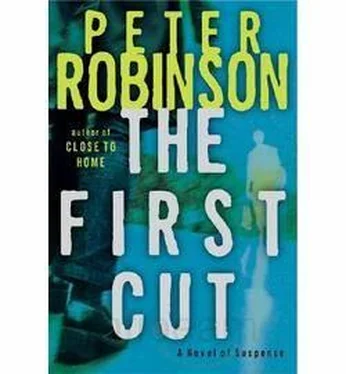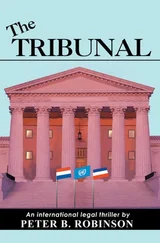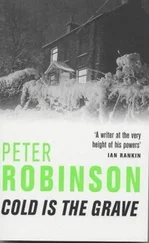She took the escalator to the women’s toilets on the fourth floor. When she pushed the door open, a frail-looking woman with a scrawny body and a large head jumped up from where she’d been sitting on the edge of a sink and quickly stuck her hand behind her back. Martha noticed that she was wearing a sales assistant’s uniform-blue suit and white blouse, with a brass name tag on the jacket identifying her as Sylvia Wield-and she looked as guilty as a schoolkid caught smoking behind the cycle sheds. When she saw it was only a customer, she relaxed and put her free hand to her chest.
“You gave me the fright of my life,” she said. “I thought it was the supervisor. Do you know, we’re not even allowed to smoke in our own lounge these days? That’s why I have to sneak in here whenever I want a fag. It’s usually quiet up here in furnishing.”
Martha smiled in understanding, then she went and sat in a cubicle until the saleswoman had gone. The shock of the meeting had made her own heart beat faster, too. When all was quiet again, she put on the wig and, looking around the door on her way out to make sure she wasn’t noticed, she slipped down the nearest staircase back into the street.
She knew she should get back to Whitby soon and check into a different bed and breakfast place, but while she was in Scarborough, she couldn’t resist a walk down to the harbor, just in case.
There wasn’t much activity there. The lobster pots were stacked on the quay, and only one or two locals stood around, painting their boats or fiddling with the engines. The smell of fish was even stronger there than it was in Whitby. Mixed with the stink of diesel oil, it made her feel nauseated. As soon as she became aware of a young lad leaning nearby against the wall and giving her the eye, she decided she was wasting her time and headed for the bus station.
On the journey back to Whitby, she read Jude the Obscure, which she had bought at the same little bookshop on Church Street after finishing Emma. Within half an hour or so, it was time to get off again. This time, instead of climbing up to West Cliff, she turned into the area behind the station, another part of the town noted for its holiday accommodation. On a terrace of tall, dark guesthouses facing the railway tracks, all with VACANCY signs in their windows, she chose the middle one.
Moments after she had pushed the doorbell, a stout young woman with rubbery features came rushing from somewhere out the back and opened the door. Her hands were wet, and she looked tired and flustered, as if she was trying to juggle ten domestic chores at once, but she managed a smile when Martha said she’d like a room. She was probably only in her twenties, Martha thought, but hard work, children and worry had aged her.
“Single, love?” Her voice had a singsong, whining quality.
“Yes, please. An attic will do, if you’ve got one.” Martha liked being high up in rooms with beams and slanting ceilings.
“Sorry, love,” the woman said, drying her hands on her pinafore. “The only single we’ve got is a small room at the back.”
“I’ll take a look,” Martha said.
It was on the second floor, a depressing little room with white stucco-effect wallpaper, looking out on backyards full of dustbins and prowling cats.
“It’s quiet,” the woman said. “Being at the back, like, you can’t hardly hear the trains. Not that there are many these days.”
She seemed anxious to please. Martha reckoned that she and her husband probably hadn’t been in the place long and were finding it difficult to make ends meet. The woman had clearly made an effort to make the hall and rooms appear cheerful, but the house itself was drab and old; it gave the impression of being damp and chilly even though it wasn’t, and its proximity to the railway tracks must surely put people off. Martha didn’t mind, though. It was hidden, anonymous. Even if it didn’t boast a view of St. Mary’s, it would make a cozy retreat. And she liked this woman, with her tired eyes and wash-reddened hands, felt sorry for her. In a way, Martha saw herself as perhaps a champion of women like this one-not just the obviously abused, attacked and assaulted, but the weary, the downtrodden and the dispirited.
“How much is it?” she asked.
“Eight pounds fifty, love. And we don’t do evening meals. I’m sorry.”
“That’s all right. I’m usually out then, anyway.” Martha thought it over quickly: it was cheap, obscure, and the woman hadn’t asked her any awkward questions about what she was doing in Whitby all alone. There would be a husband around, no doubt, but he’d probably have a day job and, with luck, she wouldn’t see much of him. Even the husband at the other place had stayed out of the way except when she had arrived and left. “I’ll take it,” she said, dropping her holdall on the pale green bedspread.
The woman looked relieved. “Good. If you’ll just come down and register, I’ll give you the keys.”
Martha followed her back down, noticing as she went how the stairs creaked here and there. That could be a problem if she had to sneak in late like before. But if she did a bit of discreet checking on her way up and down in the first day or so, she could find out exactly which stairs to avoid.
The hall was much shabbier than the one in Abbey Terrace. There was no mirror, and even the advertising flyers looked dusty and curled at the edges.
“I’m Mrs. Cummings, by the way,” said the woman, giving Martha a card to fill in. “Sorry if I seem to be rushing you, but my husband’s usually out on the boats so I’ve got to run the place more or less by myself.”
“Boats? Is he a fisherman?”
“Well, sort of. He takes groups of tourists out for morning and afternoon fishing trips. It’s not as if they catch enough to sell or anything, some of them just want a ride out in a boat. But he makes a decent living in season. Still, it means he’s up before dawn and often not back till after teatime. Depends on the tides, like, and how many want to go out. There’s good days and bad. We get by.”
It would have been too ironic to be true, Martha thought, if she had actually found herself staying in the same house as the man she wanted. But at least he might know where the fishermen hung out and what other local industries had close links to fishing. She could only question him casually, like an interested tourist, but it might be worth a try.
“Breakfast is eight to eight thirty,” Mrs. Cummings said. “I have to get it all over and done with quickly so I can get the kids off to school. And here are the keys.” She handed Martha two keys on a ring. “The big one’s for the front door. We always lock up at about half past ten but you can come in when you want, and the Yale’s for your room. There’s a small lounge on the ground floor-it’s marked-with a kettle and a telly. Only black and white, I’m afraid. But there’s teabags and a jar of Nescafé. You can brew up there any time you like.”
“Thank you,” Martha said with a smile. “I’m sure everything will be fine.”
Mrs. Cummings took the card Martha had given her. “Going out now, are you?”
“Yes, I thought I’d just have a little walk before dinner.”
“Good idea. Well, see you later…er…” She looked at the card. “Susan, is it?”
“Yes, that’s right. Bye for now.” And Susan Bridehead walked out into the late Whitby afternoon.
Yes, I am sure that Kirsten doesn’t need her stomach pumped,” Dr. Craven repeated patiently. “You saw for yourself, she brought up the tablets before they had time to work their way into her bloodstream. At worst she’ll feel a little sick and dizzy for a while-which is no more than she deserves-and she’ll probably have a heck of a headache.”
Читать дальше












